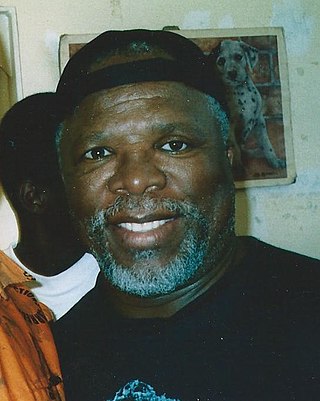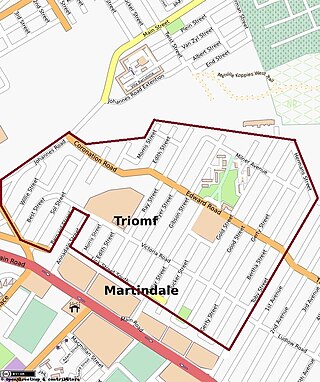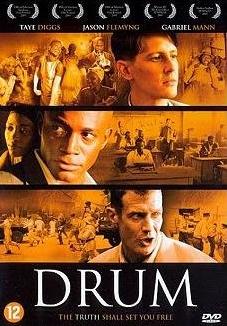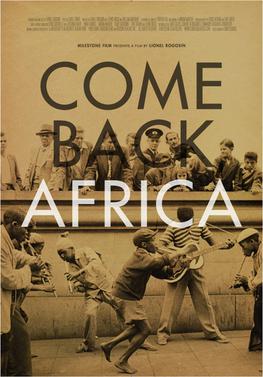Related Research Articles

Bonisile John Kani is a South African actor, author, director and playwright. He is known for portraying T'Chaka in the Marvel Cinematic Universe films Captain America: Civil War (2016) and Black Panther (2018), Rafiki in the 2019 remake of The Lion King and Colonel Ulenga in the Netflix film Murder Mystery (2019).
Dolly Rathebe (OIS) was a South African musician and actress who performed with the Elite Swingsters jazz band, and in Alf Herbert's African Jazz and Variety Show.

Sophiatown, also known as Sof'town or Kofifi, is a suburb of Johannesburg, South Africa. Sophiatown was a black cultural hub that was destroyed under apartheid, It produced some of South Africa's most famous writers, musicians, politicians and artists. Rebuilt under the name of Triomf, and in 2006 officially returned to its original name. Sophiatown was one of the oldest black areas in Johannesburg and its destruction represents some of the excesses of South Africa under apartheid.

The Market Theatre, based in the downtown bohemian suburb of Newtown in Johannesburg, South Africa, was opened in 1976, operating as an independent, anti-racist theatre during the country's apartheid regime. It was named after a fruit and vegetable market that was previously located there. It was also known as the Old Indian Market or the Newtown Market, which closed after 60 years. The Market Theatre was renamed John Kani Theatre in 2014 after the renowned South African stage actor John Kani.

Marianne Raigipcien Jean-Baptiste is an English actress. She is known for her role in the 1996 comedy-drama film Secrets & Lies, for which she received acclaim and earned nominations for the Academy Award for Best Supporting Actress and the Golden Globe and BAFTA Award in the same category. Baptiste is also known for her role as Vivian Johnson on the television series Without a Trace from 2002 to 2009, and has since starred in television shows such as Blindspot (2015–2016) and Homecoming (2018).

Drum is a 2004 film based on the life of South African investigative journalist Henry Nxumalo, who worked for Drum magazine, called "the first black lifestyle magazine in Africa". It was director Zola Maseko's first film and deals with the issues of apartheid and the forced removal of residents from Sophiatown. The film was originally to be a six-part television series called Sophiatown Short Stories, but Maseko could not get the funding. The lead roles of Henry Nxumalo and Drum main photographer Jürgen Schadeberg were played by American actors Taye Diggs and Gabriel Mann, while most of the rest of the cast were South African actors.

DRUM is a South African online family magazine mainly aimed at black readers, containing market news, entertainment and feature articles. It has two sister magazines: Huisgenoot and YOU.

Nnoseng Ellen Kate Kuzwayo was a women's rights activist and politician in South Africa, and was a teacher from 1938 to 1952. She was president of the African National Congress Youth League in the 1960s. In 1994 she was elected to the first post-apartheid South African Parliament. Her autobiography, Call Me Woman (1985), won the CNA Literary Award.
Daniel Canodoise "Can" Themba was a South African short-story writer.
William Modisane, better known as Bloke Modisane, was a South African writer, actor and journalist.

Come Back, Africa is a 1959 film, the second feature-length film written, produced, and directed by American independent filmmaker Lionel Rogosin. The film had a profound effect on African cinema, and remains of great historical and cultural importance as a document preserving the heritage of the townships in South Africa in the 1950s. It may be classified as reportage, documentary, historical movie or political cinema, since it portrays real events and people. On the other hand, it reveals an interpretation of meaningful social facts and a strong ethical assumption towards human behaviours like racism.
Karabo Moses Motsisi (1932–1977), better known as Casey Motsisi or Casey "Kid" Motsisi, was a South African short story writer and journalist.
John Arthur Mogale Maimane, better known as Arthur Maimane, was a South African journalist and novelist.
Johannes "Spokes" Mashiyane was regarded as one of the greatest pennywhistle artists who graced the South African kwela music scene from the 1950s to (approximately) the 1970s. Arriving on the pennywhistle band scene as a juvenile domestic servant from the northern Sotho communities in the Transvaal alongside contemporaries of Alexandra boys such as Lemmy Mabaso, Barney Rachabane, Elias and Jack Lerole. He stated that the pennywhistle's simplicity allowed for greater freedom to bend and blend notes. The success of his recordings provided significant revenue for his recording company, Gallo Record Company, to which he had switched in 1958. His success gained international notice by the 1960s - he played with Bud Shank among others during their visit to South Africa - and in July 1965 he was invited to the Newport Folk Festival. This festival gained notoriety for the Electric Dylan controversy, but Spokes performance at the festival did receive notice and praise from Robert Shelton. Spokes's work also had an influence on the Music of Zimbabwe. He claimed that the inspiration for his songs were from his dreams. He played with other kwela greats of his time and his music is enjoyed by many to this day. He married his wife Mary in 1964, and they had two sons, Frederick and Eugene.

Atandwa Kani is a South African actor. He is the son of actor John Kani.
Barney Simon was a South African writer, playwright and director.

The Suit is a short drama film from South Africa written and directed by Jarryd Coetsee, and produced by Luke Sharland, based on the short story by Can Themba. The film stars Tony Award-winner John Kani as Mr. Maphikela, and his son, Atandwa Kani as Philemon. Phuthi Nakene plays Matilda.
Jarryd Coetsee is a South African writer and filmmaker. His short film, The Suit won numerous international awards.
Hamilton Dhlamini, sometimes as Hamilton Dlamini, is a South African actor, playwright and a filmmaker. He is best known for the roles in the films and teleserials Isithembiso, Faith like Potatoes and The King's Messenger .
Dugmore Boetie is the pen name of South African journalist, writer, and musician, Douglas Mahonga Buti. He is best known for Familiarity is the Kingdom of the Lost, or Tshotsholoza, a fictionalised autobiographical book first published in 1969.
References
- ↑ Themba, Can (1996). The suit (Reprint. ed.). Johannesburg: Viva Books. ISBN 978-1874932147.
- ↑ "South African literature: the Drum decade". Southafrica.info. Retrieved 6 August 2016.
- ↑ J Brooks Spector (27 May 2014). "Fifty years later, time for Nat Nakasa to return home". Daily Maverick. Retrieved 16 March 2020.
- ↑ Shanthini Naidoo (11 May 2016). "SUNDAY TIMES - Can Themba's classic short story 'The Suit' comes to life on screen". Timeslive.co.za. Retrieved 6 August 2016.
- ↑ "The Suit : Synopsis". Seattlerep.org. 1 July 2015. Retrieved 6 August 2016.
- ↑ "The Suit - ESAT". Esat.sun.ac.za. Retrieved 6 August 2016.
- ↑ "Peter Brook - Théâtre des Bouffes du Nord". Bouffesdunord.com. Retrieved 6 August 2016.
- ↑ "Fledgling filmmaker tackles period short as debut". FilmContact.com. 16 February 2016. Retrieved 6 August 2016.
- ↑ "South African classic The Suit makes screen debut at DIFF 2016". balancingact-africa.com. 30 June 2016. Retrieved 6 August 2016.
- ↑ "News | The Suit". Thesuit.mandalacollective.com. Retrieved 6 August 2016.
- ↑ "The Suit - Zanzibar International Film Festival". Ziff.or.tz. 2018. Retrieved 6 August 2016.
- ↑ "Zanzibar International Film Festival 2016 award winners". Screenafrica.com. 18 July 2016. Retrieved 6 August 2016.
{{cite magazine}}: Cite magazine requires|magazine=(help) - ↑ "Bonisile John Kani | South African History Online". Sahistory.org.za. Retrieved 6 August 2016.